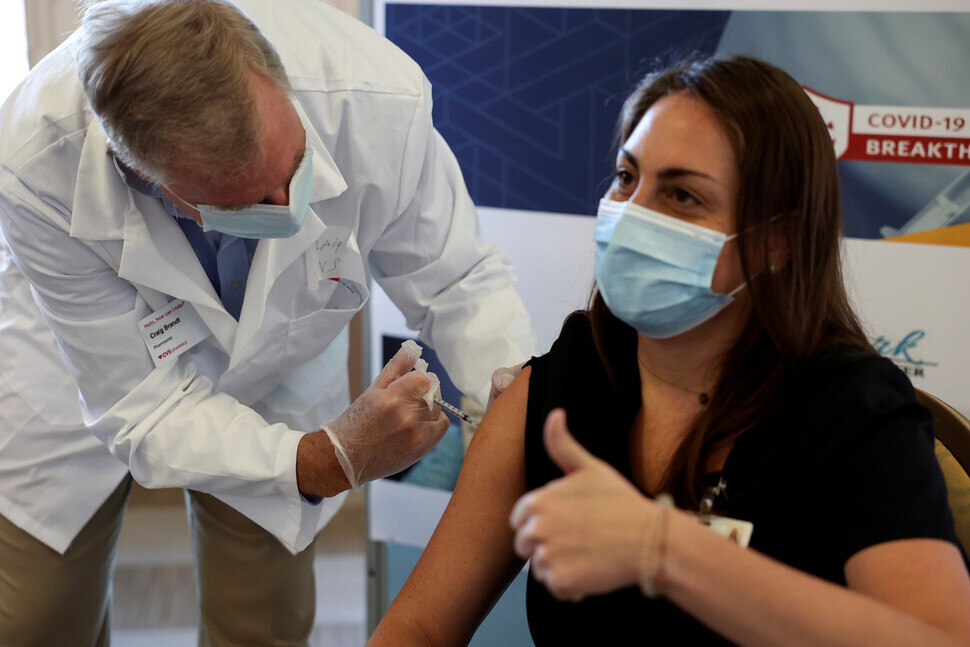hankyoreh
Links to other country sites 다른 나라 사이트 링크
29 out of 5.3 million people exhibit allergic reaction after being vaccinated in US, CDC says

At least 29 people have exhibited a severe allergic reaction after receiving a COVID-19 vaccination in the US, where some 5.3 million people have been vaccinated to date. The US Centers for Disease Control and Prevention (CDC) urged people to undergo vaccination, stressing that serious allergic reactions have been rare and that no deaths have occurred.
On Jan. 6, the Wall Street Journal reported on the CDC’s announcement that symptoms of anaphylaxis were observed in at least 29 out of the 5.3 million or so people inoculated with a COVID-19 vaccine as of Jan. 5. Anaphylaxis is a severe allergic reaction in which contact with even small amounts of a particular substance such as a vaccine or food results in symptoms such as breathing difficulty and skin rashes. The vaccines administered in the US to date were produced by Pfizer and BioNTech and Moderna, and no fatalities have been reported thus far.
As a ratio, the number of people exhibiting symptoms of anaphylaxis amounted to 5.5 in one million, or four times higher than the 1.3 for flu vaccinations. But Nancy Messonnier, director of the CDC’s National Center for Immunization and Respiratory Diseases (NCIRD), stressed that in terms of actual numbers, cases of anaphylaxis were still exceedingly rare.
“[The COVID-19 vaccine is] a very safe vaccine, and we're in the setting of 2,000 COVID deaths per day,” she said, adding that “the risk of poor outcomes, especially in senior citizens, makes it imperative that people go ahead and get vaccinated as soon as it’s available to them.”
But public health officials in various countries are stressing the need for caution in vaccinating people with a history of serious allergic reactions. June Raine, chief executive of Britain’s Medicines and Healthcare Products Regulatory Agency (MHRA), said last year that “any person with a history of anaphylaxis to a vaccine, medicine or food should not receive the Pfizer BioNTech vaccine.”
Messonnier said that anyone who exhibits an immediate allergic reaction to the first dose should not receive a second one. She also stressed that anyone with a history of allergic reactions should be observed for around 30 minutes after receiving the vaccine, and that institutions should have a system in place for responding to allergic reactions.
By Cho Ki-weon, staff reporter
Please direct comments or questions to [english@hani.co.kr]

Editorial・opinion
![[Column] The state is back — but is it in business? [Column] The state is back — but is it in business?](https://flexible.img.hani.co.kr/flexible/normal/500/300/imgdb/original/2024/0506/8217149564092725.jpg) [Column] The state is back — but is it in business?
[Column] The state is back — but is it in business?![[Column] Life on our Trisolaris [Column] Life on our Trisolaris](https://flexible.img.hani.co.kr/flexible/normal/500/300/imgdb/original/2024/0505/4817148682278544.jpg) [Column] Life on our Trisolaris
[Column] Life on our Trisolaris- [Editorial] Penalties for airing allegations against Korea’s first lady endanger free press
- [Editorial] Yoon must halt procurement of SM-3 interceptor missiles
- [Guest essay] Maybe Korea’s rapid population decline is an opportunity, not a crisis
- [Column] Can Yoon steer diplomacy with Russia, China back on track?
- [Column] Season 2 of special prosecutor probe may be coming to Korea soon
- [Column] Park Geun-hye déjà vu in Yoon Suk-yeol
- [Editorial] New weight of N. Korea’s nuclear threats makes dialogue all the more urgent
- [Guest essay] The real reason Korea’s new right wants to dub Rhee a founding father
Most viewed articles
- 160% of young Koreans see no need to have kids after marriage
- 2[Column] Life on our Trisolaris
- 3New sex-ed guidelines forbid teaching about homosexuality
- 4Presidential office warns of veto in response to opposition passing special counsel probe act
- 5How daycares became the most viable business for the self-employed
- 6OECD upgrades Korea’s growth forecast from 2.2% to 2.6%
- 7Amid US-China clash, Korea must remember its failures in the 19th century, advises scholar
- 8Months and months of overdue wages are pushing migrant workers in Korea into debt
- 9[Column] The state is back — but is it in business?
- 10[Guest essay] Maybe Korea’s rapid population decline is an opportunity, not a crisis